January 6, 2021 at 7:47 pm

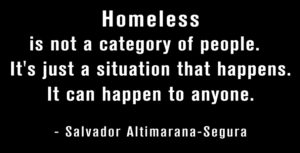
If you read my last post – “Food Pantry Rules” – you may have thought you were in some time warp. Travel had returned you to about 2010.
Well, not really.
The pandemic changed many details but the bones of a food pantry event are the same.
The volunteers and the people who shop at the pantry are the same.
Everyone comes together looking for groceries but often, they want and need far more.
Food pantry lines get longer every pantry day because people, families, struggle with change they didn’t ask for.
They are rewriting their destiny stories without a road map or instructions.
A number of people in the food pantry, both shoppers and volunteers, didn’t know about food pantries until circumstances set up a situation where they suddenly looked around and realized they were in a car in a long line waiting for food.
There is a name for this category: SITUATIONAL POOR.
A person fits into the situational poor category when she lands in a situation created by an event such as a hurricane, fire, flood, pandemic, or other disaster which destroys the home, car, job.
Food pantries offer much – peace, community, spiritual connection, groceries.
A food pantry in the basement of a church is a cross between a church and a busy pizza place.
A food pantry in a line of cars in a pandemic is reminiscent of the mass food distributions we held periodically in New York State after the collapse of the economy in 2008.
A line of cars filled with people needing food wraps around the block, down the road, and even further.
A whistle blows.
The cars begin to move. A volunteer puts a bag (s) of food in each vehicle.
Everyone wears masks.
There are still food pantries where people show up to a church and receive a bag of groceries.
But, whether the food is distributed to hungry people in cars or to hungry people walking to a building, a food pantry distribution is not a program. It is a community made up of those who gather the food and distribute it, and those who receive it. The process of distributing the food to people creates a change in everyone.
The experience does not heal a person. Nor does it change the story. It does not offer therapy. The experience itself is a conduit for each person’s own spiritual growth and change.
Never once when I was involved in a food pantry did I kid myself into thinking that I was winning the war against hunger. And, I do not kid myself now.
I know this food pantry food distribution experience does not end hunger. Instead, it offers food for several meals. And, that is all.
Ending hunger is another matter altogether.
I do feel, though, that the rules are changing. The pandemic experience is altering the hunger situation dramatically, at least. The pandemic experience is altering the hunger situation permanently.
“How is that?” you ask.
The pandemic has changed how our food is grown and distributed. Food pantries are a link in the food distribution chain. This chain now looks different. The link connections are different.
“How is that?” you ask.
For one thing, the restaurant industry is different.
Food production and distribution is different.
I do not think we know yet just what the fallout is. We have yet to live out the end of this story. We’re living and experiencing the future. For some, it is hard to see the big picture because the changes have not yet come around for each of us to see and experience in our daily lives.
In any event, the Pandemic is not us what we think. Our opinions and preferences don’t count for much here.
One thing is certain, our future is destined to be different from a future without a Pandemic. Another thing is certain for me: We can never return to our past.
We are all destined to experience a new Pandemic future.
Whatever the future brings, we need to keep on feeding the hungry in whatever way that works.
Thank you for reading this blog post. Please forward this article to your preferred social media network.
Share it with your friends.
Thurman Greco
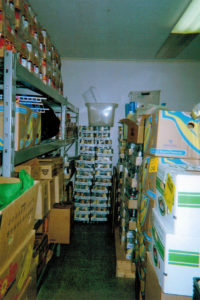
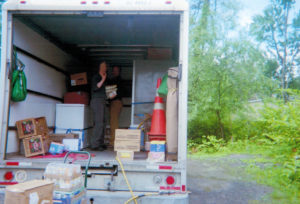

January 5, 2021 at 8:53 pm

A food pantry is what it is because of three things:
the economic situation at the moment
the volunteers
the people who shop there.
The people come together looking for groceries but often, they want and need far more.
While the coronavirus pandemic rages, the food pantry lines get longer every pantry day because people, families, deal with change they didn’t ask for.
In short, they are rewriting their destiny stories without a road map or instructions.
A number of the people in the pantry, both shoppers and volunteers, didn’t know about food pantries until circumstances set up a situation where they suddenly looked around a room and realized where they were.
There is a name for their category – SITUATIONAL POOR.
A person fits into the situational poor category when s/he lands in a situation created by an event such as a hurricane, fire, floor, pandemic, or other disaster which destroys the home, car, job.
Pantries offer much – peace, community, spiritual connection, groceries. I always think of a food pantry in the basement of a church as a cross between a church service and a busy pizza place.
A food pantry, and those connected with it, are not a program. They are a community. As volunteers, all we really do is open the door. As all the hungry people walk through the door, they undergo a change somehow.
Each person in a pantry, in whatever capacity, has experienced rejection in some way – too young, too old, too crazy, too sick, too poor, not poor enough.
The food pantry experience does not heal a person, nor does it change the story.
The food pantry experience does not offer therapy.
The food pantry is, instead, a conduit for each person’s own healing.
FOOD PANTRY RULES
Sign your name in the register as you enter the pantry.
Find a place in line.
Do not crowd or block the door to the pantry room.
No more than 2 shoppers are allowed in the pantry at one time.
No more than one new shopper is allowed in the pantry at one time.
Shop for a three-day supply of food for everyone in your household.
Place your selections on the table as you shop.
Respect the restrictions on certain foods.
Finish your shopping in 10 minutes.
Once you begin to bag your groceries, do not continue to shop.
Because the food availability is different each time you shop, it is best to visit the food pantry weekly.
Thank you.
Thurman Greco
P.S. The rules may be different at the pantry where you shop. Each food pantry is different. The space is different. The times the pantry is open is different. The management is different.
These specific rules were used in the food pantry I managed where the people were many, the space small, and the hours few.
Please forward this article to your preferred social media network.
Share it with your friends.
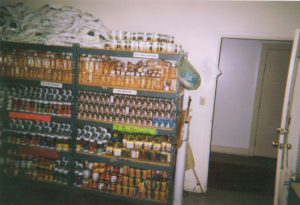
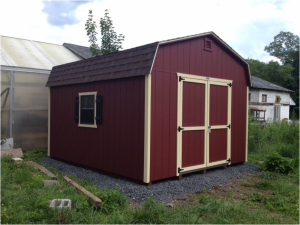


October 27, 2015 at 6:43 am

“Hunger and income inequality is probably the single biggest issue facing this country.” – Susan Zimet
When you use SNAP, you don’t just get much needed food for your household. When you use SNAP, you create a ripple effect of money for your community. You can use your SNAP card with pride knowing how your purchases will benefit your area.
Here’s how it works: SNAP is federal money. When you use your SNAP card at a local supermarket, you bring it into your community. The grocer uses the money to benefit the local grocery store. This purchase strengthens local businesses.
Are you in a household with senior/disabled members? If so, you may still qualify for SNAP even if you have a higher income. SNAP works for individuals, couples, and families.
Are you paying mandated child support? If so, this money you use to pay child support is not counted toward your income.
You can work and still qualify for SNAP, stretching your food budget every month. When you use SNAP, you more easily afford the nutritious foods you and your family need.
You can shop at a food pantry and still qualify for SNAP.
SNAP can be an important addition to you and your household budget. Apply for this benefit today to help yourself, your household, and your community. How cool is that?
Thanks for reading this blog.
The story is true. The people are real.
Don’t forget to join the email list.
Please refer this article to your preferred social media network and to anyone you know you may benefit from SNAP but is not using it.
Thurman Greco
August 4, 2015 at 7:31 am

“Hunger and income inequality is probably the single biggest issue facing this country.” – Susan Zimet
LIBRARIES ARE EXTREMELY IMPORTANT TO A TOWN, TO A COUNTRY.
Libraries are equal opportunity events offering information, learning, culture for any and all who enter. They also offer an opportunity to get in out of the rain, snow, heat. As far as I can tell, it’s easier to get into a library than it is to get into a lot of pantries.
For one thing, I don’t think you have to prove where you live to get into a library. There may be libraries out there that require proof of address, and other identification but I don’t know about them. (If you know of a library requiring identification or proof of residency to enter, please let me know. I don’t want to be wrong about that.)
Libraries are important to a community. The most important thing I carry in my wallet is my Woodstock Free Library Card. I never have to show it to anyone to use the library. I just walk in the door and all this wonder, this knowledge, this information is available to me…for nothing. But, for some reason, I feel that it’s important to carry it.
At the Woodstock Free Library, a person can even take his/her dog if it’s on a leash.
As soon as I walk in the door, I see the computers. And, of course, they are available to everyone. These computers are sooo important to those of us who are in a situation where there are only funds for rent and gas. For those in the “broke” category, a computer is out of the question.
For those in the homeless category, library computers are even more important because they are a homeless person’s ticket to communication with the outside world…especially offices such as Department of Social Services, Office of the Aging. For a homeless person seeking shelter, they are invaluable. For a housed person seeking a larger or less expensive apartment, they are necessary. A job seeker cannot get hired these days without access to a computer.
We can all get an email address quickly and cheaply at Gmail.
I’ve been connecting with area libraries recently to book a series of speeches I’ll be giving this year. Libraries in communities all around Woodstock are in such wonderful condition. They are right in town in beautiful buildings. Ample parking is available. The libraries are open for extended hours.
They have bathrooms – a luxury that we all need.
I mention these things in a blog about hunger and food pantries because, in a perfect world, I would have a library and a pantry in the same building. It only makes sense really. After all, all the people I see in the pantry are also all the people I see in the library.
Thanks for reading this blog.
Please refer this article to your preferred social media network.
Don’t forget to join the email list.
Thurman Greco














